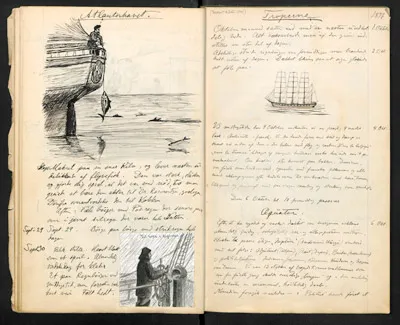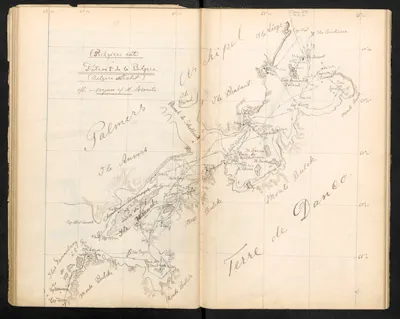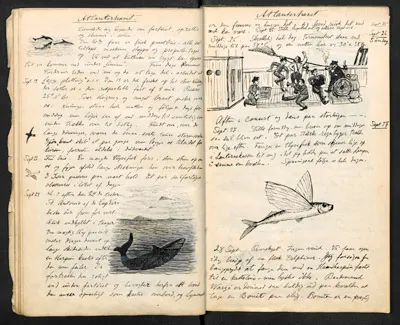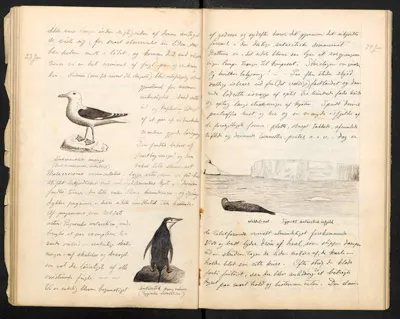Johan Koren (1879 - 1919)
Biographical notes
Seaman - Belgica 1897-99
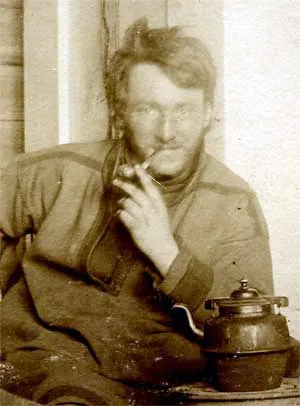 Johan
Koren was born in Fredrickstad, Norway on the 4th of October
1879, he died in the American Red Cross Hospital in Vladivostok,
Russia on the 3rd of March 1919 aged 39.
Johan
Koren was born in Fredrickstad, Norway on the 4th of October
1879, he died in the American Red Cross Hospital in Vladivostok,
Russia on the 3rd of March 1919 aged 39.
His father was a ships captain and a banker, though he had lost both parents by the time he was 11 years old. He was interested in wildlife from an early age, he had a middle school education and gained a journeyman's certificate as a carpenter.
He joined the Belgica at the age of only 17 as an ordinary seaman, as well as his role as a sailor, he also assisted Emile Racovitza the ships naturalist.
On return from the Belgica Expedition, he worked in the Zoological Museum in Oslo as a zoological illustrator, later travelling to gather birds and eggs for sale to museums with Hans TL Schaanning the ornithologist.
He overwintered on Novaya Zemlya in the high arctic in 1902-03 with Kristian Birkeland during his auroral expedition.
In 1906 he took part in a sealing expedition to Antarctica with Henrik Johan Bull though the ship he was on sank in the Crozet Islands, it was three months before the ships crew were rescued in February 1907. He was credited with keeping up morale while the men waited for a passing ship to rescue them.
He travelled widely for scientific purposes in Alaska and Siberia collecting specimens for museums and rich collectors, finding several species new to science. In 1914 he was planning his own expedition to the remote Russian north eastern region of Kolyma, "The Koren Arctic Expedition" though he resigned from the expedition as a result of financial difficulties and disagreements between members. He settled in the remote Siberian town of Nizjnekolymsk where he continued his work.
In the autumn of 1917 he was employed by a Vladivostok company, Youroveta to organize humanitarian food supplies to north eastern Siberia. On one of these trips in early 1919 he contracted Spanish flu and died in the American Red Cross hospital in Vladivostok.
His sister, Dagny Koren, would have been my mother-in-law, and his brother-in-law Carl Ramm, a US resident also born in Fredrickstad, Norway, in 1864, whom I well knew was my father-in-law.
Johan Koren always maintained close relations with these relatives. My late wife's older sister used to tell us about Uncle Johan's visit to their home. He preferred to sleep out on the New Jersey flats, and played games with his little niece, fashioning paper fish and attaching them to a string and then hiding under the dining room table while the little girl played fishing and was encouraged to recognize each fish she "caught". There is a book about his life and zoological work published in Norway "John Koren". It stated that a kind of national park around Nizhny Kolymsk in Siberia was to be named after him, and urged that Norway do likewise.
According to this book, the sailor on the Belgica - on an Antarctic expedition around 1897 - who drowned, was a Norwegian, too, and Johan left a sketch of that boy and it is printed in the book on Koren. Another book on him was written earlier and it was called "Guten som Norge glemt" that is, in English, "The Boy Norway Forgot". I hope these hasty lines may help clarify a little about Johan. Oh, yes, during the expedition he was given some zoological responsibilities and a new title He kept in touch with Amundsen throughout his life, and after his death Amundsen went to Nizhny Kolymsk to retrieve some of Koren's records for Norwegian archives.. According to some reports I saw at the Cornell University Agricultural Library, it was not an easy task with the Soviet authorities.
With best wishes, Thomas D. Bowie - by email
Sample pages from The journal of Johan Koren during the Belgica expedition
The journal of Johan Koren during the Belgica expedition in The National Archives of Norway
Biographical information
- I am concentrating on the Polar experiences of the men involved.
Any further information or pictures visitors may have will be gratefully received.
Please email
- Paul Ward, webmaster.
What are the chances that my ancestor was an unsung part of the Heroic Age
of Antarctic Exploration?

